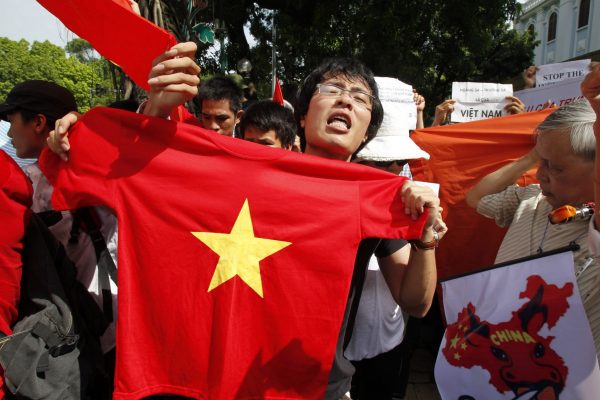The first incident involved The Gap, a US clothing manufacturer, whose store in Canada sold t-shirts depicting a map of mainland China — minus several disputed regions including Taiwan, south Tibet and islands in the South China Sea. The map drew immediate and widespread anger from Chinese nationalists, prompting the company to issue an apology and remove the t-shirts from circulation.
Shortly after, social media in Vietnam was abuzz over photos of 14 mainland Chinese tourists donning t-shirts depicting a different map of China. The tourists were part of a larger tour group of mainland Chinese who arrived at Cam Ranh International Airport in Vietnam on 13 May. The map showed China’s infamous ‘nine-dash line’, which lays claim to some 90 per cent of the South China Sea — parts of which are claimed by Vietnam. The t-shirts, apparently purchased in China, were eventually confiscated by Vietnamese authorities.
China’s nine-dash line was first inscribed on a Chinese map in 1947. In 2016, the line was declared illegal by an arbitral court in The Hague, with the court finding that the line did not comport with the 1982 United Nations Convention on the Law of the Sea (which Beijing ratified in 1996).
Beijing has ignored the court ruling, arguing instead that the court has no jurisdiction over the case. China has actively asserted its sovereignty over the South China Sea by building artificial islands and fortifying them with airstrips and radar systems. Most recently, truck-mounted surface-to-air missiles were deployed at Woody Island, where it is also believed China’s air force test-landed nuclear-capable bombers.
China’s line is a highly sensitive matter in Vietnam. The Paracels were taken from Vietnam by Chinese forces in 1974, and in 1988 Chinese forces again fought the Vietnamese and seized six reefs and atolls of the Spratly Islands after a skirmish on Johnson South Reef.
Hanoi maintains its claims through its People’s Committee of Hoang Sa District, a branch of the Vietnamese government in the coastal city of Da Nang loaded with maps, photos and historical documents to support Vietnam’s claims. Some of these maps are now depicted in billboards scattered across the country at major tourist sites.
Chinese tourists now account for roughly one-third of total international arrivals to Vietnam. While Vietnam is no doubt benefitting from the 1.36 million Chinese tourists who arrived in the first three months of this year (up 42.9 per cent from the same period last year), the revenue Chinese tourists contribute to Vietnam’s economy has been called into question. Many Chinese join prepaid (‘zero-dollar’) tours that direct tourists towards Chinese-run restaurants and hotels. Tourists also use the Chinese yuan, mobile wallet apps or unlicensed Point of Sale machines when making payments in order to skirt Vietnamese tax authorities.
Many of these Chinese tourists do not want to engage in geopolitics during their vacation, but recent displays of Chinese military strength in the South China Sea have stoked strong nationalistic responses in both countries. So sensitive is the dispute these days that when visiting Vietnam, Chinese tourists are issued a separate visa on arrival and their passports are not stamped — because China’s nine-dash line is depicted in each Chinese passport.
In response to the latest t-shirt incident, Hanoi’s reaction has been notably restrained. Hanoi chose Mai Tien Dung, Minister and Head of the Office of the Government of Vietnam, to publicly condemn the behaviour as ‘an organised act, prepared and arranged with bad intentions instead of a random, spontaneous act by the individual tourists’. For their part, local authorities have since sought directives from the Ministry of Public Security over how to respond to future incidents, but will likely be told not to go beyond confiscating offending articles.
Some Vietnamese have taken issue with the tepid response by Hanoi, arguing the offending tourists should have been immediately deported. Taipei’s strong response to a similar dispute over claims of sovereignty, as depicted on airline websites, garnered international attention and sympathy of a kind that this incident has not.
Vietnam can push back with more stringent oversight. Immigration authorities can limit the number of Chinese tourists arriving on ‘zero dollar’ tours and crack down on illegal Chinese tour operators. Additional domestic efforts could assist in bolstering Vietnam’s claims to the Paracels —the Hoang Sa Exhibition House, which showcases ancient documents that support Vietnamese claims, is one recent example of this. On the international front, Hanoi could follow Taipei’s lead and push for greater international support for its sovereignty claims.
Hanoi is probably content to let the t-shirt incident fade away. Hanoi rightfully sees this latest incident as a minor diplomatic matter, and is choosing to save its indignation for the more serious matter of China’s increasing militarisation of the disputed South China Sea.
Gary Sands is a Senior Analyst at Wikistrat and a Director at Highway West Capital Advisors.

